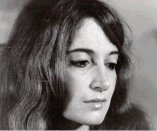|

Lyn Lifshin has written more than 100 books and edited 4 anthologies of women writers. Her poems have appeared in most poetry and literary magazines in the U.S.A., and her work has been included in virtually every major anthology of recent writing by women. She has given more than 700 readings across the U.S.A. and has appeared at Dartmouth and Skidmore colleges, Cornell University, the Shakespeare Library, Whitney Museum, and Huntington Library. Lyn Lifshin has also taught poetry and prose writing for many years at universities, colleges and high schools, and has been Poet in Residence at the University of Rochester, Antioch, and Colorado Mountain College. Winner of numerous awards including the Jack Kerouac Award for her book Kiss The Skin Off, Lyn is the subject of the documentary film Lyn Lifshin: Not Made of Glass. For her absolute dedication to the small presses which first published her, and for managing to survive on her own apart from any major publishing house or academic institution, Lifshin has earned the distinction "Queen of the Small Presses." She has been praised by Robert Frost, Ken Kesey and Richard Eberhart, and Ed Sanders has seen her as " a modern Emily Dickinson."

|
|
© 1998-2001 Lyn Lifshin / the-hold.com - all rights reserved |
|